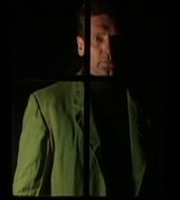
an inland empire analysis
Part
1
WARNINGS
APPROACHING THE FILM
HISTORIES
THE BASICS
IMPORTANT FACES
Part 2
MURDER
AN UNPAID BILL
PURGATORY
Part 3
THE CONNECTION
DREAM ORIGIN
IT TAKES A VILLAGE
ENLIGHTENMENT
Part
4
RABBITS
AXXON N
RED, BLUE, GREEN
AFTER MIDNIGHT
UNSOLVED MYSTERIES
MORAL OF THE STORY
Reference
LYRICS
DELETED SCENES
Discuss
AT XIXAX.COM
Part 1
Warnings
Do not read any of this if you haven't seen the film. Seriously. It will make absolutely no sense, it will ruin the movie for you, and it won't even be interesting.
Now that I have that out of the way, I'd like to welcome you to my analysis of INLAND EMPIRE. More warnings. I don't claim that this is the definitive analysis. That would probably require a 10-volume encyclopedia. You're about to read a slightly different approach. I've mostly confined my interpretation to the fundamentals. My intention is to limit my theories and assertions to things we can support with evidence and things that aren't contradicted within the film.
I don't claim that this is precisely how David Lynch views the film. In fact, let's explore this issue of intention briefly. It's unlikely that any of us will ever figure out exactly what Lynch intended, but I think it's equally likely that Lynch himself won't either. Most artists will often create things that they don't completely understand. I'm convinced that this is often this is the case with Lynch.
My theories make a lot of sense, I think, but there's a decent chance that I'm "off" about something. In many cases, there are two equally viable possibilities. When this happens, I like to mention both. Take your pick, really. See what feels right. Discuss the film with others who've seen it.
Speaking of discussion... I would very much like to compare notes, as they say, with the Lynch fans at the official message board, but it appears that the administrator has stopped approving new accounts, due to neglect or something else. (I can only hope that some Lynchian misfortune has not befallen him.) It's a shame, really, because I've learned a lot from that message board, and now it appears to be down altogether. Accordingly, I'd like to direct all discussion here.
Approaching the Film
There is indeed a wealth of INLAND EMPIRE interpretation out there, but, believe it or not, some people claim that a Lynch film should not be analyzed for meaning in this way—in particular, that you should not attempt to make sense of his plots. Roger Ebert, in his epic misunderstanding of Mulholland Drive (though it was a loving misunderstanding... I'll give him that), said "there is no explanation" and "there may not even be a mystery." Really? "If you require logic, see something else." Are you serious? In the seven years since its release, much sense, in fact, has been made of Mulholland Drive—it is a mystery that has indeed been more or less solved. Since Mulholland Drive is far easier to understand than INLAND EMPIRE, I'm going to assume that Ebert would not approve of this analysis. (He did not review INLAND EMPIRE, by the way.)
Ebert is definitely not alone in his approach to Lynch. Virtually all major media reviews of INLAND EMPIRE stuck to broad themes about Hollywood. These themes are definitely important, but they do nothing to explain the actual meaning of the film. Surely, this widespread skimming-the-surface approach happened because critics do not have the time, energy, or space to disassemble and examine the various mechanical components of such a film. The best they can do is marvel at the mystery and surrender to it.
To all those who suggest that a Lynch film should not make sense, let me suggest that you're lazy. Your point of view is not only a copout, it's insulting, because it all but accuses Lynch's films of universal meaninglessness—which could not be further from the truth. David Lynch disagrees with you, too. While he talks about meaning being personal and tells us that not everything should make sense, he also says that his films make complete sense to him in the end, and that their mysteries are largely solvable. We should keep both of these things in mind, then—that total precision of meaning is impossible, but that a coherent overall meaning is essential and achievable.
I think that INLAND EMPIRE, while certainly complex, is easier to understand than the initial viewing might lead you to believe. David Lynch has thrown a pile of obfuscating detail onto the film. While richly weird, generally interesting, and often meaningful, many of these details are not directly relevant to the core of the film and have a distinct ambiguating effect on one's overall understanding. I doubt this is anything nefarious—it's probably a natural consequence of the way the film was made. Lynch wrote much of the film as he was shooting it. In such conditions, it would have been impossible to construct a story in which every detail is co-dependently, cohesively, and non-contradictingly meaningful.
I have read countless pages of people debating these details. They do some difficult and commendable work. The problem is that very few of these discussions have ever arrived at a comprehensible, non-controversial, uncontradicted conclusion.
It strikes me that Lynch is an intuitive filmmaker interested in the big picture. I don't think he's ever been about finding meaning in trivia, and I doubt that he cares much about the inconsistencies Lynch fans have been getting exasperated over. INLAND EMPIRE is a vast network of moods and concepts, not all of which fit together. To get lost in the details is to miss the point. I'm guessing that Lynch did not draw up complex character charts and plot diagrams ahead of time. In fact, I don't even have to guess—Lynch explains it in the DVD extras:
The early scenes held something, but I didn't know what it was . . . It grew and grew. And no one will ever know how it grew that way. Cause nothing was planned. It was planned, but the final thing—you couldn't have planned it like that. No one could ever plan that.
So I'd like to get back to the basics. I'd like to examine the core components and meanings of the film.
The problem you encounter when you first begin to analyze INLAND EMPIRE is that you can't actually get to the basics without going through the details—and I certainly will go through the details. It's just that I'm going to separate the meaningful details from the less meaningful ones. (There are plenty of both.) When you go at the film with your fine-toothed comb, it's hugely tempting to pause your DVD after every odd occurrence and believe—if only for a moment—that this is the thing that will complete the equation. Unfortunately, that's rarely the case. There are countless mini-mysteries within the film. Solving these mysteries is certainly fascinating and even valuable to the whole, but I think it's massively premature to explore these side issues before you have a clear understanding of the film's fundamentals.
Histories
David Lynch has a long record of experimental filmmaking, but his style has greatly matured. His last several films—Lost Highway, Mulholland Drive, and of course INLAND EMPIRE—are what I like to call "puzzle films." (It's arguable whether Twin Peaks: Fire Walk With Me belongs in this category.) In other words, you have no idea what's going on until you've solved some kind of puzzle. Unfortunately for the unprepared viewer, fundamental things—like the plot and the identities of characters—are often themselves the puzzle. As a consequence, these films can be a lot of work. Fortunately for us—people who for some reason enjoy this kind of thing—the puzzles have increased in difficulty.
I was made a rabid Lynch fan with the release of Mulholland Drive. It completely blew my mind. I sat in the theater for several minutes afterward, watching the credits roll, wondering if I should be angry at the film or delighted by its confounding power. Honestly, I think I held both positions for a little while, but I eventually grew to love the film unconditionally.
In that spirit, I rushed to see INLAND EMPIRE in its earliest theatrical release. I was not disappointed. This is from my initial review:
The first viewing of a Lynch film is really unlike anything else. It's a beautiful, frustrating, challenging, frightening, and sometimes punishing experience, but you always feel that you've been made stronger. It's sort of how I felt after Manderlay, but on a different level.
This movie is drawn out torturously in a way very different from Mulholland Drive or Lost Highway... I think it feels something like Eraserhead. That's pretty amazing, really, because we've learned to expect a certain aesthetic, a certain visual logic, and a certain rhythm, even (or especially) in Lynch films, and that is all shattered in those moments. INLAND EMPIRE is more difficult to interpret, I think, than any other Lynch film, because of this. Some people call this a "mess," but I think it's something very different. You know there's something there, and you know it's important, and you also know that you're a long way from getting it.
After this theatrical viewing, I watched the film a few times on DVD, but I never really put much work into interpreting it. Perhaps I was in love with being punished by the incomprehension and didn't want to spoil that. Who knows.
Then, I revisited Lost Highway, which I had seen and loved but never completely understood. Well, it turns out there is a wealth of crystal-clear Lost Highway interpretation out there which basically turns a nonsensical trainwreck into something so comprehensible and simple that you can't believe you never figured it out. That inspired me to revisit INLAND EMPIRE, and you are reading the result.
Created May 18, 2009
Edited April 28, 2017
Discuss here

The Basics
"The Marilyn Levens Starlight Celebrity Show will be back next week from Hollywood, California—where stars make dreams, and dreams make stars!" [2]
Dreams do indeed make stars—and that's the first thing you should know about INLAND EMPIRE. The actress Nikki Grace (played by Laura Dern) is not real. She is a fantasy, her life as a wealthy actress is a fantasy, and her new film—On High In Blue Tomorrows—is a fantasy.
The beauty of INLAND EMPIRE's narrative structure is that it's designed to optimize its own mindblowing effect. For starters, many things are not in chronological order. The film begins with a few oddly-placed scenes—a girl in a hotel room, humanoid rabbits on TV, and some creepy business man negotiating something. As if to tempt us to forget what we just saw, Lynch draws us into a largely traditional narrative. It may have strange characters and some intensely awkward and mind-bending moments, but its structure is fundamentally sound. We follow this graceful, pleasant actress character—Nikki Grace—as she begins her new film.
This story is followed for quite a while (nearly an hour), but it eventually folds in on itself. The actors start inhabiting their roles more and more intensely, [3] until they eventually become those characters. One might think that the film has swallowed up the actors, and that the actors are now trapped in some dark fantasy—but that doesn't hold up. It's precisely the opposite, in fact. In INLAND EMPIRE, the characters are real while the actors are fake. (Lynch does have a sick sense of humor.) In other words, Sue Blue and Billy Side are real people.
The most fascinating moments in the Nikki Grace fantasy are those aforementioned awkward moments. Nikki (as we'll call her for now), who is normally sane and cheerful, begins to sport an expression ever more frequently as her fiction is drawn out—something I call "the gaze of emerging reality." Much can be seen in this gaze—fear and panic, realization and denial, confusion and dread. These moments are probably too frequent to count, but I will name a few of the more noticeable ones. The first gaze of emerging reality occurs during the production meeting. [4] The second—and the most powerful, perhaps—happens right before the script reading, when Nikki is frozen in fascination with the set of Smithy's house. [5] In her momentary trance, she repeats the words "Smithy's house" as if she's pulling up some deeply-buried memory. A third obvious one happens when she talks with Devon (between shots) about going out to an Italian restaurant, and they both begin to slip backward into their characters. [6] In the two scenes that immediately follow, she is unable to distinguish reality from fiction—she doesn't know if she's Nikki or Sue. The subsequent scene brings her as Sue to meet Nikki, whereupon Nikki literally disappears, and thus her Sue identity takes solid form. [7]
It's pretty easy to distinguish Sue Blue from Nikki Grace. Sue is quite more snarky, sharp-witted, and dark than Nikki. She has a biting, sarcastic, and sometimes condescending sense of humor. [8] Sue definitely puts herself above Billy—note that Lynch keeps him below her eye level when they're having conversations. For example, we never see him standing and her sitting for any length of time, but we do see the opposite quite frequently. This is also reflected in camera angles. Sue seems to have a lifetime of experience beyond Billy's. She looks at him as if he's a little boy, and she even calls him one. It's surprising that she finds him interesting.
Nikki, by contrast, is infinitely more cheerful, innocent, and empathetic. This difference underscores the meaning of the device. It makes sense, really, that Sue would imagine herself as Nikki Grace. She creates this fantasy that she is in fact an altogether fabulous actress only playing a grizzled, dark, dislikable woman—that she is not a grizzled, dark, dislikable woman herself. Sue also imagines that a curse is responsible for the bad fortune that supposedly befalls this glamorous movie actress. This is very much like the casting conspiracy in Mulholland Drive—it's an overelaborate piece of invention meant to explain or justify (in a character's mind) something rather simple and unpleasant.
When we watch INLAND EMPIRE, we're watching a great unfolding of inner experience. Reality burns enough holes in the Nikki Grace fantasy that it eventually unravels into different kind of dream—one that is more truthful, and one that is essentially supernatural.

[2]

[3]

[4] The first "gaze of emerging reality."
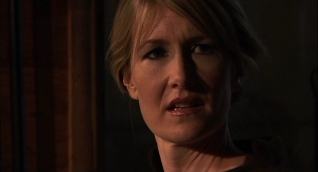
[5] A "gaze of emerging reality."
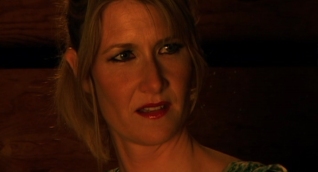
[6] Another "gaze of emerging reality."
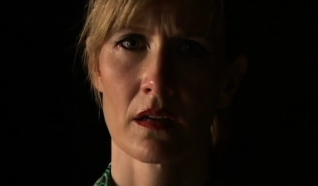
[7] Sue meets Nikki.

[8]
Important Faces
 Nikki
Grace Nikki
Grace |
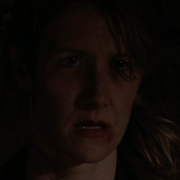 Sue
Blue Sue
Blue |
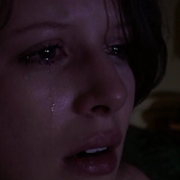 Lost Girl |
 Doris Side |
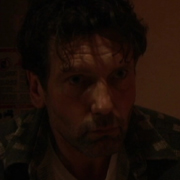 Smithy/Piotrek |
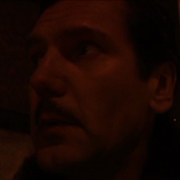 Smithy/Piotrek (Old
Poland) Smithy/Piotrek (Old
Poland) |
 The Phantom |
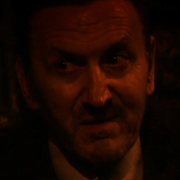 The Phantom (Old Poland) |
 Billy Side |
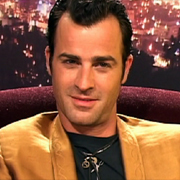 Devon Berk |
 Visitor #1 |
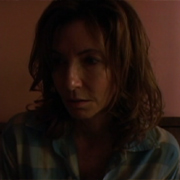 Visitor
#2 Visitor
#2 |
 Janek |
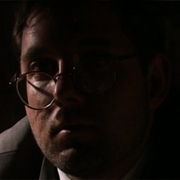 Mr. K |
NEXT: Part 2